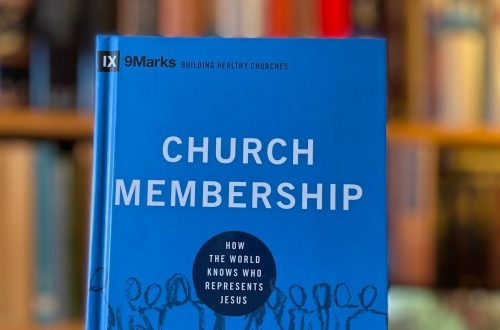 Paul really had the Corinthian church’s number. He knew all about their issues, and he never shrank back from getting in their face when they needed it. In 1 Corinthians 1:10-17, he chastises the Corinthians for dividing themselves into factions based on their devotion to different teachers. He writes:
Paul really had the Corinthian church’s number. He knew all about their issues, and he never shrank back from getting in their face when they needed it. In 1 Corinthians 1:10-17, he chastises the Corinthians for dividing themselves into factions based on their devotion to different teachers. He writes:
11 For I have been informed concerning you, my brethren, by Chloe’s people, that there are quarrels among you. 12 Now I mean this, that each one of you is saying, “I am of Paul,” and “I of Apollos,” and “I of Cephas,” and “I of Christ.” (1 Cor. 1:11-12 )
A party spirit had taken hold in Corinth, and it manifest itself in these slogans declaring loyalty to different teachers. Some followed Paul, some Apollos, some Peter, and some Christ. We are only hearing one side of this conversation, so we really know very little about what each of these factions actually believed. They may not have believed very different things at all. It may be that they were simply marked by their deference to different leaders who basically taught the same thing.
Paul corrects the misguided loyalties of the Corinthians by informing them that the body of Christ cannot be divided like that. He reminds them that there was only one Person who was crucified for them and whose name they were baptized in. That singular Person is Jesus—the only proper focus of their devotion and worship.
If this is the case, then why does Paul list the “I am of Christ” faction alongside all the others? It seems like he would want everyone to join the “I am of Christ” faction, but that doesn’t appear to be the case here. Why?
If the “I am of Christ” faction is like the other factions, they were likely playing off one teacher against the others. Some people only acknowledged the authority of Paul and would only listen to him. Others only Apollos. Others only Peter. And still others only Christ. In the latter case, however, that meant that these people were resistant to submitting to Christ’s apostles but would only listen to Christ as he spoke to them directly through the Spirit. I think Richard Hays has it right when he argues,
In context, it would seem that some of the Corinthians must have been claiming Christ as their leader in an exclusivistic way (“We are the ones who really belong to Christ, but we’re not so sure about you”). Such a claim might be coupled with a boastful pretension to have direct spiritual access to Christ apart from any humanly mediated tradition (p. 23).
In other words, the “I am of Christ” faction may have felt that they could sidestep the authority of Christ’s apostles by claiming that they heard directly from Jesus himself. In this sense they were the original red-letter Christians. Because Jesus spoke to them directly, they could sideline the apostles and other teachers in authority over them.
Is this not the same approach that modern day red-letter Christians take when they elevate the words of Jesus as if they had some special priority over the other words from scripture? This approach lends itself to the suppression of black letter texts that seem to differ from the emphases of Jesus in the Sermon on the Mount.
So the “I am of Christ” faction has much in common with the modern day red-letter faction. They play the authority of Christ against the authority of Christ’s apostles. But neither Christ nor Paul would ever have accepted such a disjunction. It is after all the red letters of Jesus that say, “[Paul] is a chosen instrument of Mine, to bear My name before the Gentiles” (Acts 9:15). Who are we to gainsay Jesus’ choice of a spokesman?
It seems that Paul’s words against the factionalism at Corinth would apply to the present case as well. At the end of the day, we do not have access to an unmediated Jesus. Jesus didn’t write a single New Testament book. We know Jesus because of the apostolic word handed down to us in the scriptures. Thus, to play Jesus off against his appointed spokesmen is a contest that neither Jesus nor the apostles would ever have accepted. And neither should we.




25 Comments
Ryan Rickard
I also appreciate how Paul, in II Corinthians 13:3 challenges those that claim that Christ is NOT speaking in him. As Piper says-they are all Red Letters!
Brendt Wayne Waters
Re: the post title and (to a lesser extent) this quote: “Is this not the same approach that modern day red-letter Christians take when they …”
Sigh. Yes, let’s be sure to identify a subset of Christianity that fails in this respect. After all, the important thing isn’t the issue; it’s the people. Now all of your readers who don’t identify themselves as red-letter Christians can walk away from your post assured that it doesn’t apply to them.
It’s odd (and perhaps ironic — I’ll have to consult with Alanis on the proper use of that word) that an article decrying the elevation of one Christian (or group of Christians) to the degradation of another, does just that.
Daryl Little
So let’s not speak out against any group that is in error (or in this case, grave error) because we might miss another group or we might be in error in some way?
Seriously?
So your comment doesn’t apply now, because you failed to mention all the ways in which you do this very thing as well. Right?
Brendt Wayne Waters
Daryl, my apologies for not replying sooner, but WordPress’ notification program EPIC FAIL’d me and let a dozen or more comments be posted (including yours) without bothering to notify me, as I had requested.
The problem with the OP is that the error which it identifies is in no way limited to the faction against which it speaks. To the contrary, the vast majority of Christendom falls into this error often, regardless of which side of which issue we are talking about.
In my estimation, the larger point of the Scripture passage (and perhaps of the OP, too) is that, no matter how holy we make it sound (“I am of Christ”), dividing into factions is wrong. But because the post limits the issue to one faction, the reader has a good chance of missing this larger point and applying it to his/her own life and tendencies to commit this error. Instead the *natural* inclination is for the non-RLC folks to assume this doesn’t apply to them (or worse, for some, bolster their feelings of superiority) and for the RLC folks to see this as yet another attack on them (and not even bother to see how this might apply to them).
You concluded that I was saying that we should “not speak out against any group that is in error”. I did not say that, but perhaps you’re closer to what I meant than I originally thought when I first read your reply. What I *am* saying is that our *primary* effort should be to point out the error, with noting the group(s) committing it coming in as a distant second.
Andy Stanley once asked, “Do you want to make a point, or do you want to make a difference?” Not being God, I can’t tell you what Dr Burk’s motivation is. But the way that the post *comes off* leans much more heavily to the former than the latter.
James McCullough
Though people on this blog might get defensive over this, it applies to ESV people, NIV people, reformed vs Armenian people, and all other hosts of theological and biblical persuasions that fall under the umbrella of orthodoxy. It would be an error to think that the Corinthians believed themselves “of Apollos” only because they thought that Apollos was cooler. They called themselves “of Apollos” because they thought it made a substantial enough theological difference that they needed to call themselves something different. We protestants fall into this same trap frequently.
Derek Rishmawy
I wasn’t aware the Reformed were in conflict with Armenian people. Has the Gospel Coalition formed a sovereign nation in neigboring Azerbaijian? Haven’t the Armenians suffered enough?!
Aaron (@AaronRedeemed)
Like a laser beam!
David Biel
“They called themselves “of Apollos” because they thought it made a substantial enough theological difference that they needed to call themselves something different.” Says who? Where would you pull this from the context of Paul’s instruction here?
Don Johnson
I agree we are not to try to form a canon within the canon, no matter how tempting this might be. All Scripture is inspired and authoritative and not just parts, even the (supposed) red letter parts. I see the red letters as an addition to Scripture, as such they may be helpful or harmful in aiding our ability to understand.
And we are not to form factions, but we do this all the time.
Pingback:
Morgan Guyton
The beautiful irony here is that you’re doing exactly what Paul was criticizing the Corinthians for doing. You’re taking a potshot at another faction, the “social justice” Christians who get more jazzed about talking about the Sermon on the Mount than the four spiritual laws, through very dubious exegesis. Paul was going after people who would rather argue about doctrine and who’s in and who’s out than build up the body of Christ. Why not enjoy being challenged by Red Letter Christians as well as James Christians and 1 John Christians and Philippians Christians? We’re all different parts of the body who are drawn to different emphases within the canon. Not everyone likes the hard pavement of the Romans road.
Grant Walsh
well stated, Morgan.
Aaron (@AaronRedeemed)
But, consequentially, didn’t you just accuse Paul of doing what you’ve accused Denny Burk of doing? So by your logic, Paul was creating his own faction for criticizing those in Corinth who were.. factioning… hmm… No. It’s altogether right to call out a group who have clearly marked themselves out (i.e. “red letter”), in the manner of Paul here. There is not subsequent “Denny faction” – there simply is one theologian pointing out that a particular group resemble the “I am of Christ” crowd at Corinth. Did Paul take a moment to “enjoy being challenged by them”? No. Why is that suddenly mandatory? Do the Red Letter folk take time to learn from the confessional folk? I don’t know… Moreover, Paul wasn’t accusing anyone of taking potshots, but was actually criticizing their quarreling and divisiveness. Maybe we can take away something positive from Denny’s article instead…
Rachel Stone
But does not the Gospel Coalition faction acts as though they are the only defenders of the Gospel?
Pingback:
Grant Walsh
Denny,
You totally missed the point of “Red Letter Christians”. We are just trying to re-claim some of the teachings of Jesus that have either been glossed over, left behind, wrongly turned into metaphor, or chalked up to be “too hard to actually live out”. RLC’s believe in and take seriously the whole Bible and all teachings therein. We dont minimize Paul, John, Peter, or any OT writer. In Claiborne/Campolo’s book, they explicitly say that “all Scripture is inspired.” You totally misrepresented us and in doing so created another unneeded faction…ironically.
Tony Smoke
All I hear is a bunch of weeping and gnashing of teeth.
mikey
I had to stop and laugh when Denny felt he had to point out that Jesus didn’t write a single book of the New Testament. All credibility in the blog post suddenly vaporized before my eyes. Good times.
Denny Burk
Why did that observation cause you to see no credibility? I’m not following you.
Pingback:
Pingback:
Tyler
I think a better way of reading ‘Red-Letter Xians’ (I’m assuming this post comes as a response to Claiborne/Campolo book release. And even though the author of present post appeals to Paul for argument it remains difficult not to see this as reducible to argument against Xians with alternative politics.) would be through appeal to ‘canon within a canon’. Jesus’ teachings, for ‘Red-Letter Xians’, form the canon within the canon, the interpreting rest of scripture through its hermeneutic. Rather than seeing, as author above, ‘Red-Letter Xianity’ as factionalism (and thus, by implication, heterodox, etc), an appeal to canon within canon allows for constructive vision of those who make claims about authority of teachings of Jesus, while simultaneously leaving canon within canon as open to critique for significant aspects of New Test. (or even aspects of Jesus) that it fails to foreground.
Morgan Guyton
It really is remarkable how much mileage you get out of three words. If you’ve got enough yes men, then any eisegesis works.
Brendt Wayne Waters
Morgan, that’s an interesting statement, as it’s equally true no matter which side of the three words you are on. 🙂
Zachary Martinez
Why follow Jesus? And why follow Paul? A person studies Jesus’ life, teachings, and becomes convinced by them; they decide to follow Jesus. The question remains: should they follow Paul? To choose to follow Jesus, but not Paul, could be a perfectly sensible decision. You quote Acts 9:15, but a person might believe in Jesus yet not believe in the Book of Acts, and hence not believe that Jesus said what Acts claims he said. Whenever I read a verse of the Bible I am unsure about, I pray and ask the Holy Spirit to tell me if it is from God or not; when the Holy Spirit tells me a verse is not from God, I do not believe it. The Holy Spirit has not yet definitely instructed me one way or the other concerning Acts 9:15, but I feel much doubt.